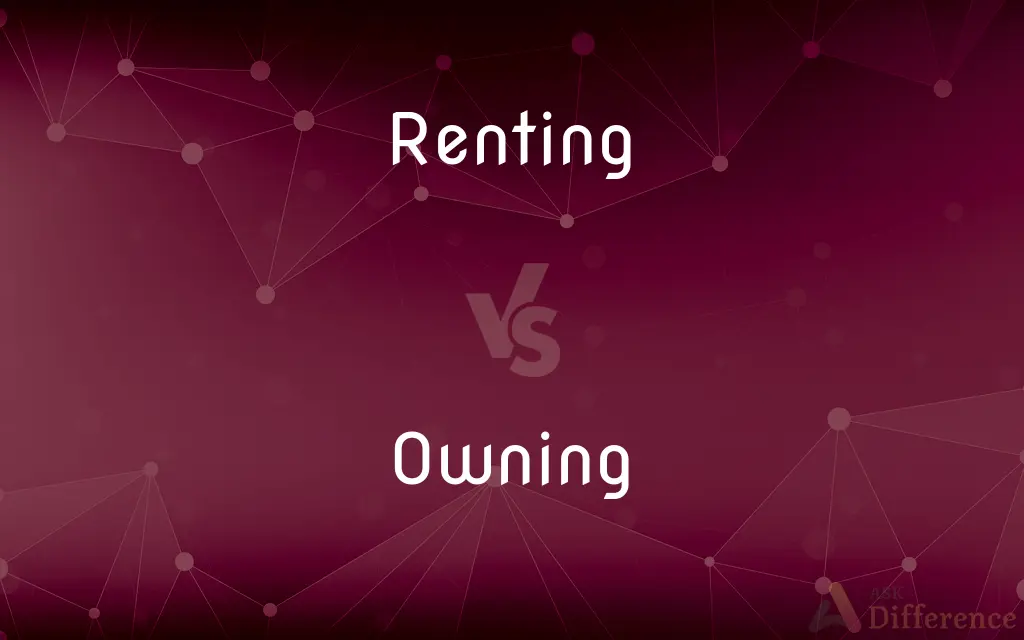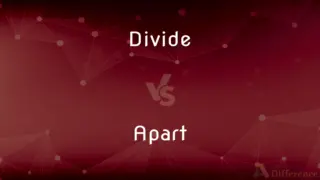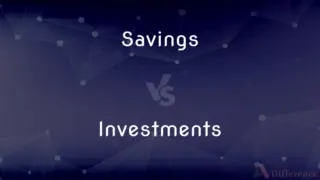Renting vs. Owning — What's the Difference?
By Tayyaba Rehman & Fiza Rafique — Published on September 20, 2023
Renting means paying a fee to use someone else's property, typically a home or vehicle, for a specified time. Owning means you have legal possession of the property and can use it as you see fit without regular payments to a landlord or seller.

Difference Between Renting and Owning
Table of Contents
ADVERTISEMENT
Key Differences
Renting is the act of paying someone, often a landlord or a company, to use their property. It usually involves a lease or rental agreement that specifies the terms and conditions, including the duration and cost. Owning, on the other hand, means you have legal possession of a property, whether it's real estate, a car, or other items. Unlike renting, ownership usually involves an upfront cost and possible ongoing costs like maintenance but does not include regular rental fees.
Both renting and owning have their advantages and disadvantages. Renting often provides more flexibility, as you can easily move once the lease is up, and it typically requires less upfront money. Owning a property often gives you the freedom to modify it and may offer long-term financial benefits like equity build-up. However, it usually requires a larger initial investment and long-term commitment.
From a grammatical perspective, "renting" is often used as both a noun and a verb ("I am renting an apartment" or "The renting of equipment is common"), while "owning" is usually a verb but can also function as a gerund ("Owning a home is expensive" or "The owning of rare art pieces is a luxury"). Both words can serve different syntactical roles depending on the sentence in which they appear.
In summary, renting and owning are two ways to acquire the use of property but are distinct in terms of cost, legal obligations, and long-term benefits. Renting is more of a short-term commitment and usually more flexible, whereas owning is a long-term investment that offers greater stability but comes at a higher initial cost.
Comparison Chart
Definition
Paying to use someone's property
Having legal possession
ADVERTISEMENT
Duration
Short-term or defined by lease
Indefinite, until sold or given
Financial Commitment
Regular payments, lower upfront
Higher upfront cost, no rent
Legal Rights
Limited by lease agreement
Full legal rights
Part of Speech
Noun and Verb
Verb and Gerund
Compare with Definitions
Renting
Paying to temporarily use someone else's property.
He's renting a beach house for the summer.
Owning
Having legal possession of a property or item.
She enjoys owning her own home.
Renting
A contractual arrangement for short-term property usage.
Renting a car is convenient for tourists.
Owning
Having full authority over a property or asset.
Owning a business is both challenging and rewarding.
Renting
The act of leasing property.
Renting can be more flexible than owning.
Owning
Controlling or having rights to something.
Owning a patent gives you exclusive rights.
Renting
An alternative to ownership with lower upfront costs.
Many people prefer renting apartments in the city.
Owning
Holding the title to a property.
Owning land can be a good investment.
Renting
Payment, usually of an amount fixed by contract, made by a tenant at specified intervals in return for the right to occupy or use the property of another.
Owning
Being accountable for something you possess.
Owning a pet requires responsibility.
Renting
A similar payment made for the use of a facility, equipment, or service provided by another.
Owning
Of or belonging to oneself or itself
She makes her own clothes.
Renting
The return derived from cultivated or improved land after deduction of all production costs.
Owning
That which belongs to one
I wanted a room of my own.
Renting
The difference between the price paid for use of a resource whose supply is inelastic and the minimum price at which that resource would still be provided. Also called economic rent.
Owning
To have or possess as property
Owns a chain of restaurants.
Renting
An opening made by rending; a rip.
Owning
To have control over
For a time, enemy planes owned the skies.
Renting
A breach of relations between persons or groups; a rift.
Owning
To admit as being in accordance with fact, truth, or a claim; acknowledge
"I own that I have been sly, thievish, mean, a prevaricator, greedy, derelict, / and I own that I remain so yet" (Walt Whitman).
Renting
To obtain occupancy or use of (another's property) in return for regular payments.
Owning
To make a full confession or acknowledgment
When confronted with the evidence the thief owned up to the crime.
Renting
To grant temporary occupancy or use of (one's own property or a service) in return for regular payments
Rents out TV sets.
Owning
Infl of own
Renting
To be for rent
The cottage rents for $1,200 a month.
Renting
A past tense and a past participle of rend.
Renting
Infl of rent
Renting
The act by which something is rented; a rental.
Renting
The act of paying for the use of something (as an apartment or house or car)
Renting
An agreement where possession is temporary.
She's renting a booth at the craft fair.
Common Curiosities
What is Renting?
Renting means paying to use someone else's property for a specified time.
Can Renting lead to Owning?
Yes, some rental agreements include options to buy.
What part of speech is Owning?
Owning is usually a verb but can also function as a gerund.
Is Renting long-term or short-term?
Renting can be either, but it's usually considered a shorter-term arrangement.
Do you build equity when Renting?
No, you do not build equity when renting property.
Is maintenance included in Renting?
Usually, most maintenance is the landlord's responsibility in a rental arrangement.
What is Owning?
Owning means having legal possession of a property or item.
Is Owning permanent?
Owning is usually a long-term commitment, although you can sell the property.
What part of speech is Renting?
Renting is both a noun and a verb.
Is Renting cheaper than Owning?
Renting usually requires less upfront money, but owning may be cheaper in the long run.
Do you build equity when Owning?
Yes, you build equity over time as you pay off your mortgage.
Can you modify property while Renting?
Usually, modifications require the landlord's approval when renting.
Can you modify property when Owning?
Yes, you can make modifications when you own a property, subject to laws and regulations.
Is maintenance a part of Owning?
Yes, when you own a property, maintenance is your responsibility.
Is Renting or Owning better?
Both have pros and cons; the better option depends on your financial situation and lifestyle needs.
Share Your Discovery

Previous Comparison
Divide vs. Apart
Next Comparison
Savings vs. InvestmentsAuthor Spotlight
Written by
Tayyaba RehmanTayyaba Rehman is a distinguished writer, currently serving as a primary contributor to askdifference.com. As a researcher in semantics and etymology, Tayyaba's passion for the complexity of languages and their distinctions has found a perfect home on the platform. Tayyaba delves into the intricacies of language, distinguishing between commonly confused words and phrases, thereby providing clarity for readers worldwide.
Co-written by
Fiza RafiqueFiza Rafique is a skilled content writer at AskDifference.com, where she meticulously refines and enhances written pieces. Drawing from her vast editorial expertise, Fiza ensures clarity, accuracy, and precision in every article. Passionate about language, she continually seeks to elevate the quality of content for readers worldwide.












































